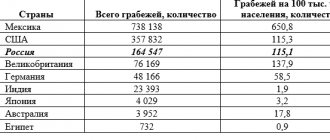- Composition and signs of robbery
- Punishment for robbery
- Examples of real cases under the criminal article “robbery”
- The difference between robbery and other articles of the Criminal Code of the Russian Federation
According to statistics from the Ministry of Internal Affairs of the Russian Federation , robbery is one of the most common crimes of a selfish and violent nature.
Thus, in 2021 alone, more than 50 thousand cases of robbery were officially registered.
The increased social danger of robbery lies in the open method of theft, which the guilty person resorts to in order to take possession of someone else’s property, which distinguishes robbery from theft, as well as in the presence of harmful consequences for the personality of the victim and his rights: during robbery, harm to the health of citizens is possible, violation of inviolability is possible home, personality, freedom and other constitutional rights and freedoms.
It should be noted that robbery is one of the oldest crimes. From the earliest days of private property, individual members of society tried to take away property and other people. In order to prevent criminal attacks, laws were adopted punishing the commission of robberies.
In Russia, the first mentions of robbery as a separate crime date back to the 14th-15th centuries (Pskov Judgment Charter, Novgorod Loan Charter and other early Russian acts of rule-making). From the very first laws, robbery was viewed as an open form of theft, distinguished from robbery by the absence of violence dangerous to life and health.
Let's consider the elements of simple robbery under Part 1 of Article 161 of the Criminal Code of the Russian Federation.
- Object: someone else's property, additional objects in the form of inviolability of person and home are also possible.
- Objective side: open seizure of someone else's property against or against the will of the victim. By open seizure it is meant that the crime occurs in front of the owner or strangers, if the guilty person understands that those present are aware of the illegal nature of his actions.
- Subject: a sane individual who has reached the age of fourteen.
- Subjective side: guilt in the form of direct intent, the goal is selfish.
Only if all the indicated signs are present in totality can we say that the act is robbery under Article 161 of the Criminal Code of the Russian Federation.
“Does the amount of damage matter when qualifying an act under Part 1 of Article 161 of the Criminal Code of the Russian Federation and can liability for robbery arise in the event of open theft, for example, of products in a store? When answering this question, it should be borne in mind that, in contrast to such forms of theft as fraud, theft and misappropriation or embezzlement, criminal liability for the commission of which, in the absence of special qualifying signs, occurs when the amount of the stolen goods exceeds 2,500 rubles, for robbery there is a minimum The amount of stolen property that triggers criminal liability is not established by law. That is, as a general rule, the size of the stolen property does not matter in order to qualify the actions of the accused as robbery. However, it should be borne in mind that depending on the specific circumstances of the case, the investigative and court authorities have the right to release a person from criminal liability, and in particular in the described case, with reference to Article 14 of the Criminal Code of the Russian Federation , which states that the act, although containing signs of a crime, but due to its insignificance not representing a danger to society, cannot be considered a crime.”
The article in question, Article 160 of the Criminal Code of the Russian Federation, in addition to simple robbery, also contains qualified and especially qualified offenses. Thus, criminal liability increases if a crime is committed:
- by a group of persons by prior conspiracy;
- with intrusion into a home, premises or storage;
- with the use of violence that is not dangerous to life and health (with the threat of its use);
- on a large scale (the value of the stolen property exceeds 250 thousand rubles);
- organized group;
- on an especially large scale (the value of the stolen property exceeds 1 million rubles).
Classification based on objects of theft
Telephone
Outright theft of cell phones is common these days. This is not surprising given the high cost of most mobile devices. The amount of damage, that is, the object of theft, does not play a role in this case. Often such thefts involve more serious crimes. Let’s say that the injured party was able to resist, but the attacker used violence, for example, threatened with a knife.
Money
If we are talking about open theft of funds, it, in fact, has no differences from the theft of property. In order for actions to be qualified correctly, it is important to determine the amount of damage (amount).
Goods
The crime of shoplifting is quite common. Most often, expensive food products and luxury alcohol are stolen. As a rule, such acts do not entail harm to health or life, or the use of physical or mental violence. Many retail establishments have video surveillance cameras installed, which reduce the number of such attacks. But issues related to bringing the perpetrators to justice do not lose their relevance. As for the courts, they treat such persons quite humanely, especially if the robbers compensated for the damage and paid the fine.
Punishment for robbery under Article 161 of the Criminal Code of the Russian Federation
Alternative punishment for robbery under Part 1 of Article 161 of the Criminal Code of the Russian Federation:
- up to 480 hours of compulsory work;
- up to 2 years of repairs;
- from 2 to 4 years of restriction of freedom;
- up to 6 months of arrest;
- up to 4 years in prison.
The mildest punishment for the act enshrined in Part 2 of Article 161 of the Criminal Code of the Russian Federation is up to 5 years of forced labor, the most severe is placement in a colony for up to 7 years. In this case, a fine and restriction of freedom may be applied as additional punishment. If the robbery occurred as part of an organized group or on an especially large scale, the perpetrator faces 6 to 12 years in prison. A fine of up to 1 million rubles or restriction of freedom for up to 2 years is also possible.
What punishment under Part 1 of Article 161 of the Criminal Code of the Russian Federation is most often assigned for robbery?
According to the Judicial Department under the Armed Forces of the Russian Federation , in 2018, out of 13 thousand people convicted under this article, more than 5.5 thousand people were placed in a colony. Of these, more than 2.6 thousand convicts received a sentence of 1 to 2 years. In approximately 30% of cases, the court imposed a suspended sentence: more than 4 thousand citizens received suspended sentences. About 2 thousand convicts were sentenced to compulsory labor. As for robbery under aggravating and especially aggravating circumstances, the most common punishment for the perpetrators is imprisonment for a term of 2 to 3 years.
The final sentence is influenced by many mitigating and aggravating circumstances.
Let's consider several real cases under the criminal article “robbery”.
A resident of the Khabarovsk Territory, who stole 7 thousand rubles from one of the passengers on a train, was convicted under Part 1 of Article 161 of the Criminal Code of the Russian Federation and received 1 year and 4 months in a general regime colony. The woman tried to appeal the verdict, but was unsuccessful. Not the least role in this was played by the fact that the convicted woman had previously repeatedly received sentences for committing other property crimes.
A resident of the Kirov region, in a state of intoxication, stole several bottles of vodka worth more than 1,000 rubles in front of sellers. The court found the man guilty of committing a crime under Part 1 of Article 161 of the Criminal Code of the Russian Federation and sentenced him to 8 months of corrective labor with the withholding of 10% of earnings in favor of the state.
Note that quite often robbery is combined with other crimes - murders, thefts, etc. Of course, this circumstance influences the final sentence in the direction of tightening it.
Statute of limitations
The maximum term of punishment in the form of isolation from society in the MLS is 7 years under this part of the article.
According to Art. 15 of the Criminal Code of the Russian Federation, such a crime is classified as serious. Art. 78 of the Criminal Code of the Russian Federation indicates that for serious acts the statute of limitations is ten years. In total, it turns out that the statute of limitations for this crime is ten years. On our website you can find other information regarding the qualifications of robbery, including learning about the differences between violent robbery and robbery.
The difference between robbery and other articles of the Criminal Code of the Russian Federation
Robbery is similar in composition to other property crimes. However, there are certain differences.
- Theft (Article 158 of the Criminal Code of the Russian Federation) . The main difference between theft and robbery is that theft is always committed secretly, that is, hidden from the owner of the thing and third parties. If the culprit commits a crime openly, but those present do not realize the illegality of his actions (for example, they think that the property belongs to the criminal), the act is classified as theft. If the theft began to be carried out secretly, the owner or third parties noticed it, but the criminal did not stop his actions, then the act is classified as robbery.
- Robbery (Article 162 of the Criminal Code of the Russian Federation) . Unlike robbery, robbery is always accompanied by violence that is dangerous to the life or health of the victim (or the threat of its use). Robbery may be committed with violence, but it is considered harmless to the victim.
In practice, it can be quite difficult to distinguish between the compositions in question. The court must take into account the situation in which the act was committed, the nature of the impact on the victim, the victim’s subjective attitude towards threats against him and many other circumstances. If the judicial investigation is not carried out thoroughly enough, there is a possibility that the person who committed the crime will not receive the punishment that he deserves.
Is it possible to group with an agreement in the context of a robbery?
Such situations are very rare in practice. However, these cases do occur and may be, for example, similar to this one.
Two tipsy and “thrill-seeking” friends were walking along a sparsely populated street. They noticed a man walking leisurely in front of them, carrying a bag under his arm. One of the friends ran up to the passerby, pushed him hard, and the bag fell to the ground. The second young man picked up the fallen bag from the ground and ran away after the first.
Thus, we see that there was no prior conspiracy to commit the robbery, but in fact the robbery was committed by a group of persons in the form of two co-principals (both of them directly took part in the crime).
Do you need a lawyer?
Should I look for an experienced private lawyer or should I trust a public defender? Despite the fact that the sanction of Article 161 of the Criminal Code of the Russian Federation is an alternative one, you should not expect that the court will impose a punishment not related to imprisonment. As we have seen, the courts prefer to place citizens who have committed robbery in colonies. And the state lawyer has little motivation to ensure that his client does not receive a real prison sentence. Therefore, it is better to entrust the case to a qualified criminal lawyer.
Ideally, the lawyer seeks to conclude the criminal case (prosecution) as early as possible, before the preliminary investigation stage comes to an end. If this goal could not be achieved, the defender will strive to turn the situation in favor of his client further. So, it can achieve the following results:
- issuance of an acquittal;
- reclassification of the act to an article providing for a less severe punishment (for example, from robbery to theft);
- reclassification of the act to a part of the article providing for a less severe punishment (for example, from Part 3 to Part 1 of Article 161 of the Criminal Code of the Russian Federation);
- imposing the most lenient punishment without applying additional punishment provided for in the sanction of the article;
- assignment of a suspended sentence;
- assistance in parole.
If we are talking about victims of robbery, then the lawyer will help, firstly, to achieve the initiation of a case and bring the perpetrators to criminal responsibility, and secondly, will contribute to the recovery of fair monetary compensation from the convicted persons.
Contacting a lawyer at an early stage significantly increases the chances of a successful outcome of the case. However, you can also enlist the help of a specialist after the fact, when the verdict has already been passed: it is likely that the defense attorney will be able to find important “clues” and appeal the judicial act.
Material and moral damage: features of recovery
A person who has suffered as a result of a crime committed against him may make a demand that the culprit compensate him for material and moral damage, if there are appropriate grounds for this. This decision is made exclusively in court.
A civil claim is available after a criminal case has been initiated and until the completion of the judicial investigation. In the event of a civil claim, the plaintiff receives an exemption from paying state fees.
This claim may be subject to consideration in civil proceedings. It all depends on the nature and extent of the harm caused. This issue is regulated by clause 4, part 1, art. 73 Code of Criminal Procedure. If a statement of claim is received, the investigator makes a decision that the person be recognized as a civil plaintiff.









